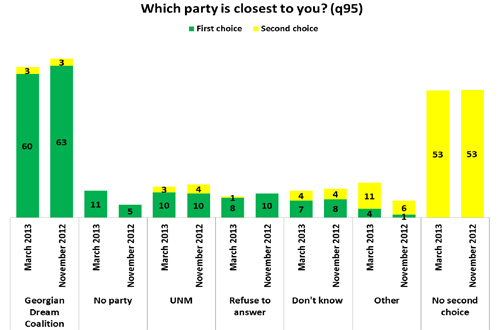| NDI Poll: GD Maintains Strong Support |
| Civil Georgia, Tbilisi / 22 Apr.'13 / 18:57 |

Screengrab from NDI-commissioned March, 2013 survey
(UPDATE: adds PM Ivanishvili’s comment on poll results in fourth paragraph)
Georgian Dream (GD) coalition maintains a strong support among voters, according to March poll, with 60% of respondents identifying it as the party closest to them, giving GD a 6-1 lead over UNM, which had 10%, same as in a similar poll in November.
The survey, released on Monday, was fielded by the Caucasus Resource Research Centers (CRRC) for the U.S. National Democratic Institute on March 13-27 and was funded by Swedish International Development Cooperation Agency (Sida). The survey was conducted through nationwide face-to-face interview with 3,103 respondents and has a margin of error plus, minus 2.5%.
Asked whom would you vote for if local elections, scheduled next year, were held tomorrow, 62% of likely voters named GD and 9% - UNM; 17% said they "don't know"; 6% refused to answer and 2% responded they would vote for none of the party.
Commenting on poll results, PM Bidzina Ivanishvili, who is now visiting Strasbourg, told Georgian journalists that UNM’s “rating is inflated two-fold” in NDI survey. “We also carry out polls and they [UNM] have no more than 4%,” Ivanishvili said.
Asked which party's candidate would you most like to see as the next president, 58% of likely voters named GD candidate and 8% - UNM candidate; leader of Christian-Democratic Movement, Giorgi Targamadze, was named by 3% and leader of Labor Party, Shalva Natelashvili by - 2%; 17% did not know; 6% refused to answer.
Asked how important it is to have strong opposition party in the country, 78% of respondents said that it’s either very important or important; among those respondents who are GD supporters the figure stood at 77%. UNM has been identified as "the strongest opposition" party in the country by 56% of respondents.
Favorability and Job Performance
The latest poll, like similar previous ones, includes a survey on how voters respond on a question whether they "like" or "dislike" specific figures.
The list includes about twenty eight politicians, plus Patriarch of the Georgian Orthodox Church, Ilia II, who enjoys the highest favorability ratings (92%) among the persons on the list.
While most politicians’ favorability ratings decreased, or in few cases stayed statistically the same since similar poll in November, parliament speaker Davit Usupashvili and UNM parliamentary minority leader Davit Bakradze both saw increased favorability beyond the margin of error.
Davit Usupashvili’s favorability rating was at 66% - the second highest among the politicians.
PM Ivanishvili continues to be the most popular political leader with 75% favorability rating in March, down from 80% in November.
President Saakashvili, who is UNM chairman, had favorability rating of 25% in March, down from 29% in November and far below of Bakradze’s favorability rating of 48%, which is the highest among opposition politicians, up from 42% in November.
GD lawmaker, Tina Khidasheli, is the third in the list of politicians with 59% (61% in November) favorability rating (she is wife of parliament speaker Usupashvili), followed by GD MP Eka Beselia – 53%, down from 61% in November; GD MP vice-speaker of parliament Zviad Dzidziguri – 52%, down from 60% in November; UNM parliamentary minority leader Davit Bakradze 48%; GD MP Koba Davitashvili – 43%, down from 53%; GD MP Davit Berdzenishvili – 41%; GD MP Zakaria Kutsnashvili – 37%; GD MP and vice-speaker of parliament Manana Kobakhidze – 36%, down from 45% in November.
Favorability rating of former PM and secretary general of UNM party, Vano Merabishvili, remained statistically the same in March at 26%.
Tbilisi Mayor, Gigi Ugulava, had 25% in March, down from 29% in November.
63% of respondents rated PM Ivanishvili’s job performance either as “very well” or “well”, compared to 69% in November.
15% of respondents rated President Saakashvili’s performance either as “very well” or “well” in March, statistically the same as in November.
Respondents were also asked how they assessed PM Ivanishvili’s job performance in respect of specific areas; most of the positive assessments were made in respect of situation in prisons with 40% assessing PM’s performance in this area either as “very well” or “well”, followed by healthcare (39%); agriculture (38%) human rights and relations with Russia (35% each).
Highest negative assessments were made in respect of PM’s job performance in areas such as jobs with 29% assessing it either as “badly” or “very badly” and poverty (26%). There was a large portion of respondents who were assessing Ivanishvili’s performance in various specific areas as neither badly nor well.
Positive assessment of Parliament’s performance rating increased from 23% in November to 30% in March with 46% of respondents assessing it as neither badly nor well. Parliament’s positive assessment stood at 20% in August, 2012 poll.
Justice Minister Tea Tsulukiani; Defense Minister Irakli Alasania and Interior Minister Irakli Garibashvili are among top three cabinet ministers with highest positive performance ratings.
The poll is part of a broader survey, which also looks into Georgian voters’ attitudes to various current and policy issues; that segment of the survey was released last week.
